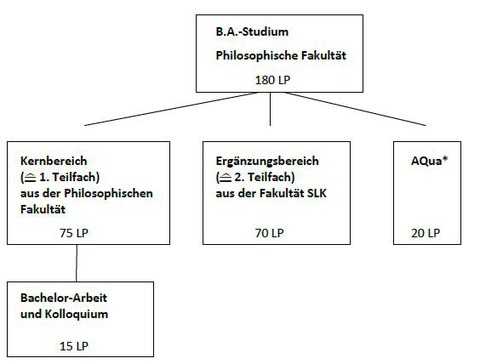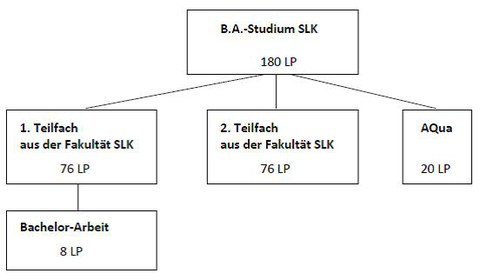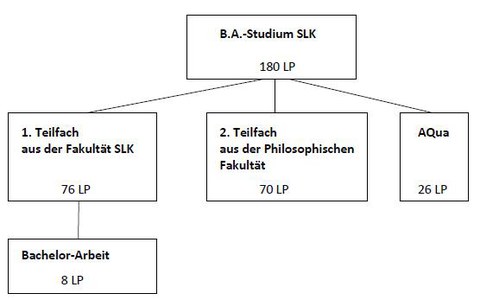General Qualification (AQua) in the Bachelor's degree programme Linguistics, Literature and Cultural Studies (discontinued)
Table of contents
General information
The General Qualification area (Allgemeine Qualifikation - AQua) is, as stipulated in the overarching study regulations § 6 and in addition to the two sub-disciplines chosen, an obligatory part of the Bachelor's degree programme Linguistic, Literature and Cultural Studies.
In the AQua area, modules of either 20 credit points or 26 credit points must be chosen. The possible modules are listed in Appendix 1: Module Descriptions General Qualification (AQua). These can be freely combined in accordance with § 6 of the overarching study regulations. This means that some of the sub-disciplines have defined certain modules of the AQua area to be compulsory modules. The number of credit points (20 or 26) to be acquired is determined by the choice of the sub-disciplines:
Your sub-disciplines are two of the subjects English and American Studies, German Studies, Classical Philology, Romance Studies and/or Slavic Studies of the Faculty of Linguistics, Literature and Cultural Studies.
Since both sub-disciplines (Teilfach) in their modules result in 76 credits (Leistungspunkte - LP) and the Bachelor's thesis is credited with 8 credits, there remain 20 credits for the AQua area, in order to achieve 180 credits for the degree programme.
Your 1st sub-discipline is one of the subjects English and American Studies, German Studies, Classical Philology, Romance Studies or Slavic Studies and your 2nd sub-discipline is one of the Faculty of Arts, Humanities and Social Sciences (Protestant Theology, History, Catholic Theology, History of Art, History of Art/Musicology or Philosophy).
The 1st sub-discipline (Teilfach) covers 76 credits (Leistungspunkte - LP) and the 2nd sub-discipline of the Faculty of Arts, Humanities and Social Science 70 credits. For the Bachelor' s thesis, which is written in the 1st sub-discipline, you receive 8 credits.
Since the 2nd sub-discipline of the Faculty of Arts, Humanities and Social Science is credited with 70 credits (instead of the 76 credits of the 1st sub-discipline), this results in 26 credits for the AQua area in this option. In this case you need to take the module Freie Auswahl in order to achieve the additional 6 credits.

* Hierbei richtet sich der Bereich AQua nach den Vorgaben dern Philosophischen Fakultät und umfasst 20 LP.
Your core area is in the Faculty of Arts, Humanities and Social Science (Protestant Theology, History, Catholic Theology, History of Art, or Philosophy) and the supplementary area is chosen from the Faculty of Linguistics, Literature and Cultural Studies (SLK). This option is for completeness only. If you choose this option, you are enrolled in the Faculty of Arts, Humanities and Social Science. If you have any questions concerning your core subject, please refer to the staff of the related faculty.
Structure/Modules
The AQua area consists of five modules, which you can take and combine as you wish:
The AQua area offers six modules that are labeled as foreign languages. These are basically structured in the same way (4 SWS language training seminars, module examination: short presentation and language exam, 5 credit points). They differ only in the language level that can be achieved. This is based on the Common European Framework of Reference for Languages (CEFR) and comprises the levels: A1, A2, B1, B2, C1.1 and C1.2. If you already have basic language experience, you may, for example, continue with a foreign language from level B2. If you want to learn an unknown language, module A1 is recommended. The number of foreign language modules you have to take depends on the regulations of your sub-discipline. You can take the language learning seminars at the Faculty of Linguistics, Literature and Cultural Studies or at TUDIAS. Please note that you have to take two exams (a language exam and a short presentation) to complete the foreign language module. If the examiner does not offer the short presentation, please contact them directly and refer to the study documents. The short presentation may be structured differently depending on the course (e.g. a short oral presentation, a group activity, etc). You may also have language courses credited from a previous degree programme. However, crediting foreign language skills from school education is not possible. The modules of the Foreign Languages area can be credited more than once if the selected languages are different. Thus, if you have first chosen the module Foreign Languages A1 and have taken Italian A1, you can have the basics of Polish also credited in the module Foreign Languages A1 in a further semester. You only have to consider that none of the selected languages may be the same as the language you are studying. In the above example, your sub-disciplines must not be Romance Studies (focus Italian) and/or Slavic Studies (language practice - Polish).
Note: If you have already successfully completed all the necessary exams in a language training seminar (= 2 SWS), then you have to attend another language training seminar (= 2 SWS) according to the module description, but you do not have to take any further exams to complete the module. Please make sure that both of the language training seminars have different contents (phonetics, morphology, etc.), but are the same language.
Please note: Language training seminars in German cannot be credited due to legislation, as this is the language of study.
Module descriptions in the over-arching Study Regulations (p.9-18)
In addition, the AQua area offers the possibility of taking the modules Basic Competencies. These are divided into the module Overview and the module Specialisation. Both offer the possibility to choose individual courses from the catalogue AQUA, which is published every semester on the homepage of the Faculty SLK. In principle, it is not necessary to take both modules of the Basic Competencies. It is also possible to choose only the module Basic Competencies Specialisation. The Basic Competencies Overview module is no prerequisite for this. The difference is in the credits that are awarded after successful completion of the module examination. In the module Basic Competencies Overview you can acquire 5 credits after you have completed at least 2 SWS and thus a graded examined assessment in the scope of 5 credits. The module Basic Competencies Specialisation offers the possibility to achieve 10 credit points after you have completed at least 4 SWS and at least one graded examined assessment. You may also take the modules Overview and Specialisation several times if the contents of the courses differ.
Module descriptions in the over-arching Study Regulations (p.19-22)
A further module of the AQua area is the internship. This is not a compulsory internship, but an optional module. If you decide to take this module, you may have an internship of at least four weeks credited. The module examination consists of a report and will be credited with 5 credits upon successful completion.
There is a Guidline for writing a report available for download (in German only).
On the homepage of the Faculty under Studies there is a password-protected area (internship and job offers), which is updated according to the offers. Please ask the Faculty Students' Council for the password. You may of course also organise your internship of at least four weeks on your own.
Module description in the over-arching Study Regulations (p.23)
The AQua area also offers the possibility of having a stay abroad credited. For this purpose, three modules have been created to cover different types of stay.
- The first module Stay abroad - 5 weeks, allows you to have credited at least 5 weeks stay abroad (5 credits) after successful completion of the module examination (report).
- If you spend at least 10 weeks abroad, you can take the module Stay abroad - 10 weeks. After a passed report (module examination) you will get 10 credits.
- If you do more than one stay abroad, you may opt for the module Stay abroad - 2x5 weeks, which credits both stays. The module examination consists of two reports (one for each stay) and is credited with 10 credits. You must select this module if you have chosen two of the sub-disciplines English and American Studies, Romance Studies, and/or Slavic Studies.
There is a Guideline for writing a report available for download.
Module descriptions in the over-arching Study Regulations (p.24-26)
The Free Selection module is another module in the AQua area. You have to take this module if your 2nd sub-discipline is chosen from the Faculty of Arts, Humanities and Social Science (Protestant Theology, History, Catholic Theology, History of Art, History of Art/Musicology, or Philosophy). If you choose the 2nd sub-subject from the offer of the Faculty SLK, you do not need to take this module.
If your 2nd sub-discipline is chosen from the Faculty of Arts, Humanities and Social Science, you choose at least 2 SWS (i.e. at least one course) from the catalogue AQUA. The examined assessment of the course must be credited with at least 6 credits in order to complete the module examination. However, you may also decide to take more than one course, the individual courses adding to 6 credits. At least one of the examined assessments must be graded in order to calculate the grade of the module examination.
Module descriptions in the over-arching Study Regulations (p.27)
Which of these modules you are required to take, depending on your choice of subjects, and an example of how this may be done, can be found in the FAQ.
Courses offered
You may find here both the current courses offered in the AQua area and the courses that were offered in the previous semester.
Certificates (Scheine)
Proof of examined assessments in AQua is collected on the AQua-Sammelschein form, which you can also find on the website of the Joint Examination Office. The individual examined assessments may also be certified on the AQua-Teilleistungsschein.
Please have the AQua-Sammelschein or the gathered Teilleistungsscheine be confirmed by the Academic Advisor of your 1st major. The overall recognition of the AQua-Sammelschein with the signature of the Academic Advisor is done at the Examination Office. In order to avoid delays in issuing the Bachelor's degree certificates, please submit the AQua area to the Examination Office as early as possible.
Please note! Students who have enrolled before 1st October 2013 must use the old Sammelschein.
All certificates may also be found on the pages of the Joint Examination Office of the Faculty of Linguistics, Literature and Cultural Studies and the Faculty of Arts, Humanities and Social Science.
Discontinued degree programmes
Students of the Bachelor's programme who have enrolled by 30th September 2013 are subject to different requirements.


